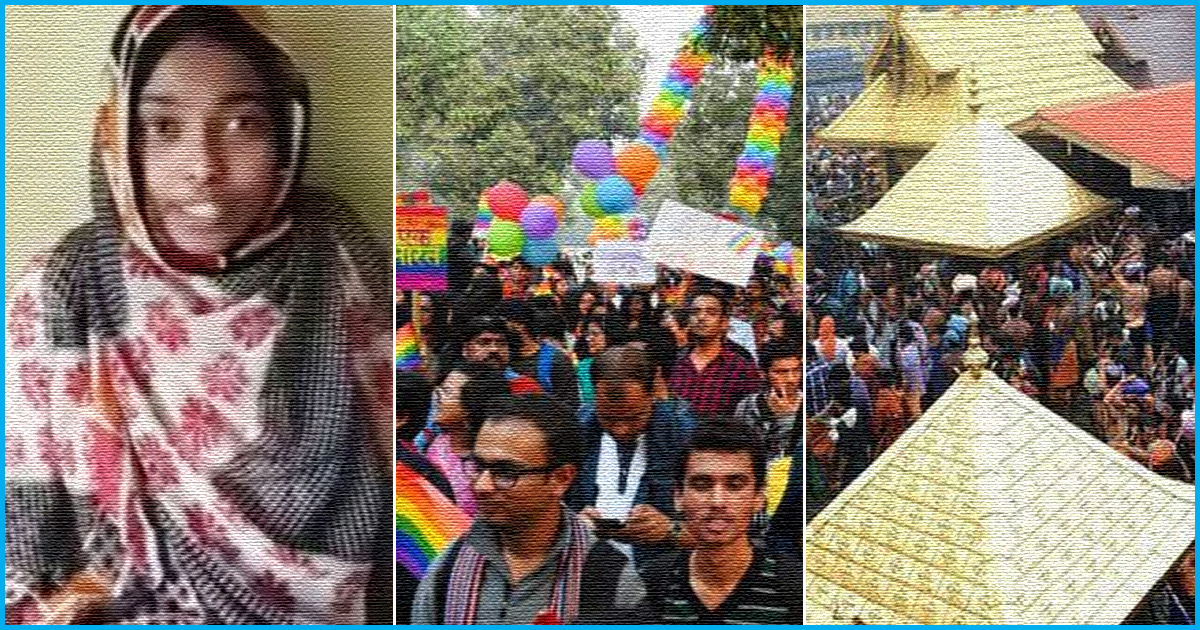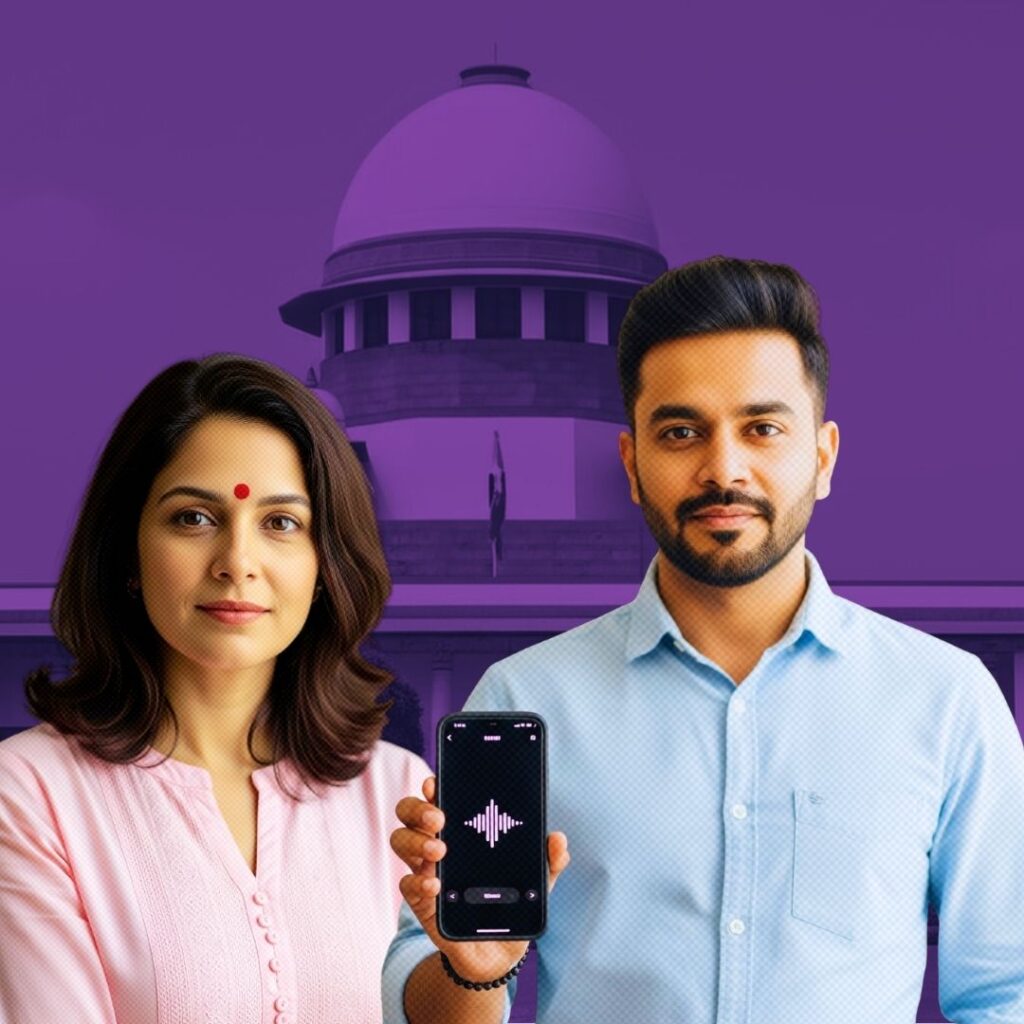“Neither the life of an individual nor the history of a society can be understood without understanding both” – C. Wright Mills.
In 2018, the Supreme Court of India created history through its declaration of significant verdicts in important cases including the abolition of Section 377, decriminalisation of adultery law, Sabarimala verdict and the constitutional validity of Aadhar judgement. Though the verdicts induced a wide range of reactions among the citizens – varying from happiness, anger to despair – they changed the lives of many.
The dignitaries who headed these landmark judgements were in the news too. One cannot forget the much talked about press conference conducted by four senior-most judges, where they were publicly vocal about the misuse of power by the then Chief Justice of India Dipak Mishra. Among them was Justice Ranjan Gogoi who has succeeded Dipak Mishra to be the present Chief Justice of India. Recently, following his retirement, Justice Kurian Joseph upheld his decision to conduct the controversial press conference in January 2018.
Let’s check out some of the groundbreaking verdicts of 2018 announced by the figureheads of SC that will reverberate for years to come.
Decriminalisation of section 377
Supreme Court scrapped the 158-year-old British era law, Section 377 of Indian Penal Code (IPC), which prohibited same-sex relationship between two consulting adults in private. It was considered as a criminal offence with punishment of lifetime or up to ten years. The five-judge bench, headed by former chief justice Dipak Mishra decided to pull out the petitions filed by renowned dancer Navtej Singh Johar, journalist Sunil Mehra, celebrity chef Ritu Dalmia, historian Aman Nath and businesswoman Ayesha Kapur.
Finally, on September 6 2018, SC decriminalised homosexuality highlighting that consensual sex between two adults of any gender is no more crime. After their prolonged struggles, the queer community can finally hope to march ahead with their heads raised henceforth.
“History owes an apology to the members of this community and their families for the delay in providing redressal for the ignominy and ostracism that they have suffered through the centuries,” stated Justice Indu Malhotra, a quote which has has been celebrated by the LGBTQ community in India.
The Hadiya verdict
In December 2016, Hadiya, born as Akhila in a Hindu family, married Shafin Jahan, a Muslim man after a religious conversion. Hadiya’s father claimed that Jahan is a criminal and his daughter was trapped by Islamist networks. Her father had filed a habeas corpus claiming that her daughter had been brainwashed. After an appeal by Jahan, the top court summoned Hadiya to interact in open court and sent her to continue her studies.
In May 2017, Kerala HC annulled the marriage between Hadiya and Jahan. It further handed over 24-year-old Hadiya’s custody to her parents and ordered a full-fledged investigation in the matter.
After Jahan moved the Supreme Court, SC questioned the judgement of Kerala HC on a number of grounds. In January 2018, a three-judge Supreme Court bench headed by erstwhile CJI Dipak Mishra observed that the National Investigation Agency (NIA) cannot probe on the validity of Hadiya’s marriage, setting aside the verdict by Kerala High Court. SC questioned the Kerala HC judgement by underlining the Article 21, “the right to marry a person of one‘s choice is integral.”
“She is a 24 years old girl. If an adult says she is married out of her own free consent, how can one contest that marriage?” the bench remarked.
Aadhar judgement
The Supreme Court upheld the constitutional validity of Aadhar card on September 26 after striking down multiple sections of the Aadhar Act as unconstitutional. The SC declared that it was not mandatory to link Aadhar with government and private entities to avail any service. The five-judge bench headed by CJI Dipak Mishra struck down Section 57 of the Aadhar (Targeted Delivery of Financial and other subsidies, Benefits and Services) Act 2016 that previously allowed private entities to use Aadhar number for verification. However, the apex court approved the linking of the permanent account number (PAN) to the unique Aadhar number and notifications permitting people to acquire the benefits and subsidies provided by the government.
Sabarimala verdict
For the first time in Indian history, SC questioned the age-old practice of ban on entry of women within the menstruating age bracket in Sabarimala temple in Kerala. On September 28, the apex court brought an end to the centuries-old tradition by stating that women of all ages can now enter Sabarimala temple. SC noted that the ancient custom at the shrine was not an essential religious practice. The verdict comprised judges Dipak Misra, R F Nariman, A M Khanwilkar and D Y Chandrachud.
However, the revolutionary judgement invited vehement protests from the temple authorities and many citizens who staunchly believed in restricting women from the shrine. Despite the SC verdict, the issue still continues to reside in a whirlpool of controversy.
Decriminalisation of adultery
On September 27, the Supreme court ruled down the adultery law of the 19th-century terming it as unconstitutional. The bench stated that adultery cannot be henceforth adjudged as a criminal offence and it is not violating a person’s right to privacy to any extent. The 158-year-old law under section 497 of Indian Penal Code where a man was criminalised for having a sexual relationship with another man’s wife without the husband’s consent, is now invalid in the court of law. While reading the judgement, CJI Dipak Misra mentioned, “The husband is not the master of the wife,” a comment which earned accolades. By decriminalising the adultery law, the top court once again proved that it could pave the way for reconsideration of other archaic laws like conjugal rights and marital rape.
National Anthem in cinema halls
At the outset of 2018, the Supreme court reversed its earlier order of mandating cinema halls to play the national anthem at the beginning of any movie. Previously, the apex court had issued an order stating that the audience in the cinema hall must stand up when the national anthem is being played. The judgement was altered after one of the petitioners asked for clarification regarding its previous decision. It was then that the bench comprising Justice Dipak Mishra and R Banumathi ruled out their earlier verdict by stating that it is not compulsory for people to stand up when the national anthem is being played as part of the storyline of a film, newsreel or documentary.
Creamy layer in SC/ST quota in promotion
One cannot always rely on justice in India, and it is still a mixed bag of emotions in society as no law can fit everyone in a diverse country like India. On September 26, a five-judge bench of the Supreme Court ruled that the creamy layer concept can be extended to Scheduled Castes (SCs) and Scheduled Tribes (STs), highlighting that denial of job promotions to the economically better off among these two communities. Earlier, the creamy layer concept was applied only to the Other Backward Class. However, the idea was not applicable to SC/ST as it was asserted as the backwardness of these communities were based on untouchability and not on economic factor. The SC also ruled that the states will not have to collect data on the backwardness of SC/ST employees for reservation in job promotions in government offices.
Live-streaming of court proceedings
This was one of the significant milestones in the judiciary’s work with an urge to depict transparency in the court proceedings. The three-judge bench headed by CJI Dipak Misra, Justice A M Khanwalikar and D Y Chandrachud gave a final nod to live-stream court proceedings in order bring more judicial accountability and intensify the rule of law. The fight for transparency goes back to March 2018, where senior advocate Ms Indira Jaising had asked the top court to video record or live-stream cases of only national importance or which will impact the public at large. “Sunlight is the best disinfectant,” the bench said while passing the verdict.
Passive Euthanasia
On March 9, 2018, a constitution bench headed by Chief Justice Dipak Mishra, passed a unanimous judgement that gave legal sanction to passive euthanasia and “living will”. Recognising the right to die with dignity, the Supreme Court allowed execution of “living will”, which would allow patients, if in future he/she is in a vegetative state due to an irreversible terminal illness, to state their wishes in advance regarding whether they would like to artificially prolong their life or not.
After an NGO Common Cause filed a PIL in 2005 stating that a person should be given the right to refuse life support if the medical expert opines that the patient suffering from some terminal disease has reached a point of no return. The apex court also added that life support can be removed after the statutory medical board announces that the patient is incurable.
Cauvery dispute verdict
On February 2, 2018, the Supreme Court finally put an end to an age-old controversial Cauvery River Dispute, where it increased Karnataka’s share of the Cauvery water by ordering it to release only 117.25 TMC of water to Tamil Nadu, reducing from the previous 192 TMC. This allowed Karnataka to get an additional 14.75 TMC of Cauvery water. The three-judge bench gave the verdict saying that it will remain valid for more 15 years and they will monitor the implementation of the order.
Also Read: Rape Accused Can Still Be Prosecuted Even If Survivor Turns Hostile: Supreme Court











